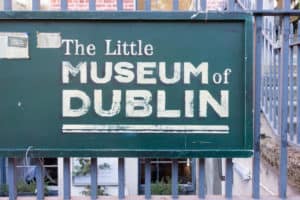Traditional Irish Craft Workshops: A Guide to Authentic Artisan Experiences
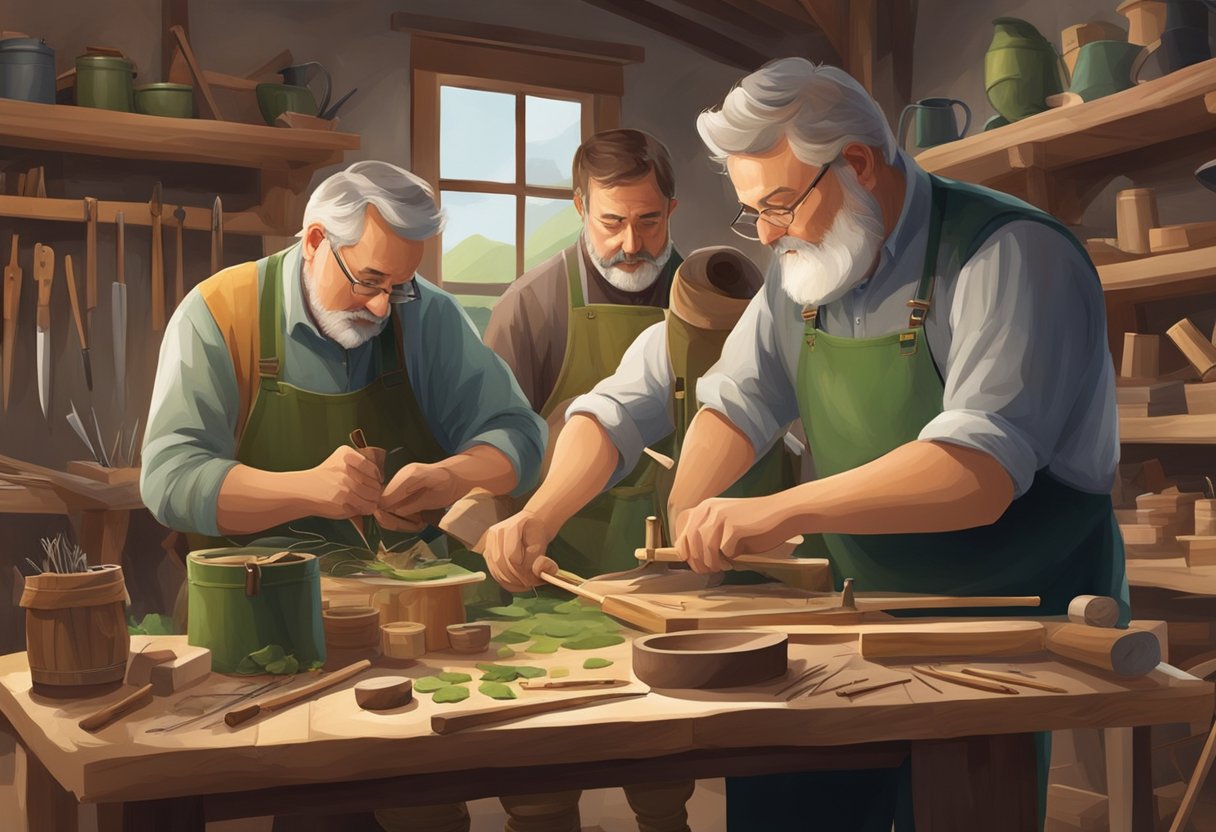
Updated On: April 22, 2024 by Ciaran Connolly
In Ireland, traditional crafts are not just remnants of the past, but living practices that continue to thrive and shape contemporary culture. Irish crafts embody centuries of knowledge and heritage, standing as symbols of national identity and artistic expression. From the intricacy of lace-making to the rugged beauty of handwoven tweed, each craft tells a story of the land and the hands that made it. Workshops across the country offer a gateway to this world, inviting both locals and visitors to experience the magic of creating something truly Irish with their very own hands.
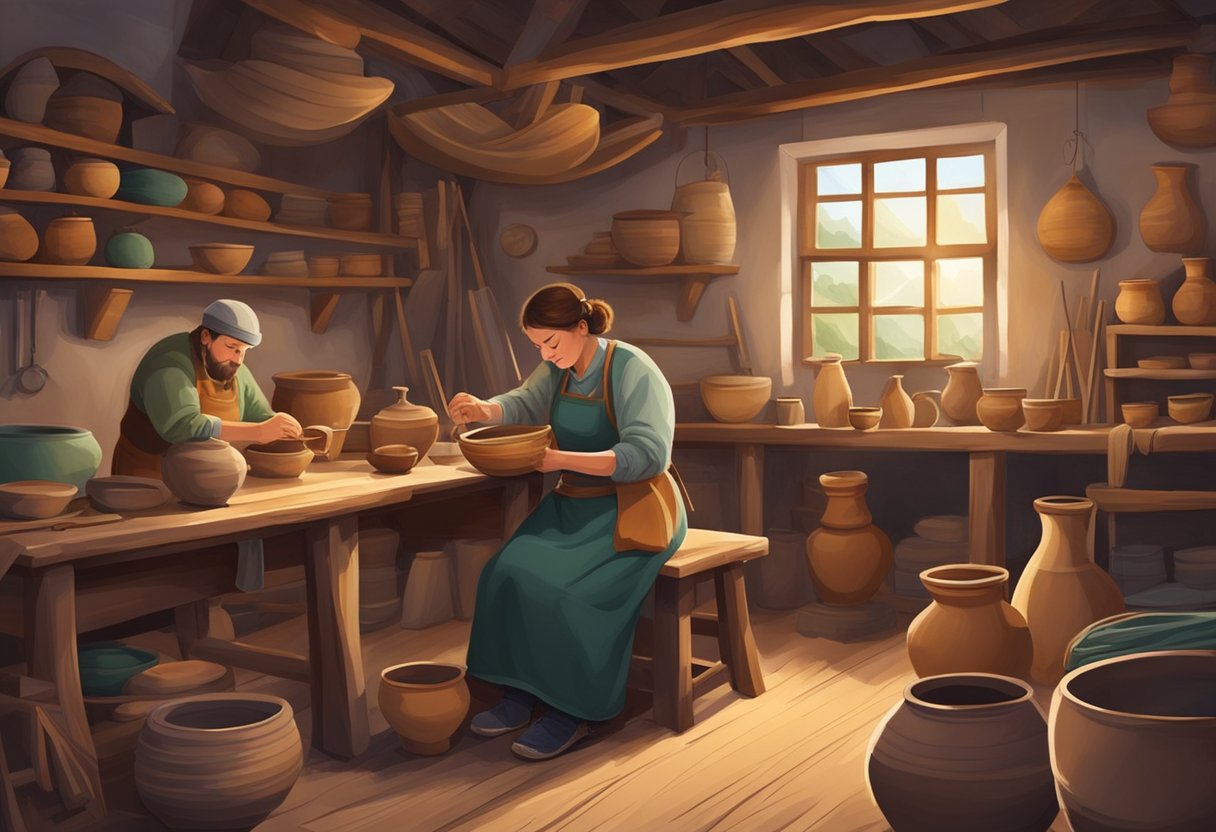
Craft workshops in Ireland serve as hubs of learning and creativity, where the richness of Irish history is interwoven with practical skills that have been passed down through generations. Participants in these workshops get the unique opportunity to engage with masters of the craft, gaining insight into the meticulous techniques involved. Whether it’s learning to play the bodhrán, trying your hand at pottery, or weaving a traditional basket, these experiences provide an immersive glimpse into Ireland’s cultural fabric.
Key Takeaways
- Traditional Irish crafts are a vibrant part of Ireland’s heritage and identity.
- Workshops provide immersive experiences with skilled artisans.
- Engaging in crafting is a way to connect with Irish culture and tradition.
The History of Irish Craft
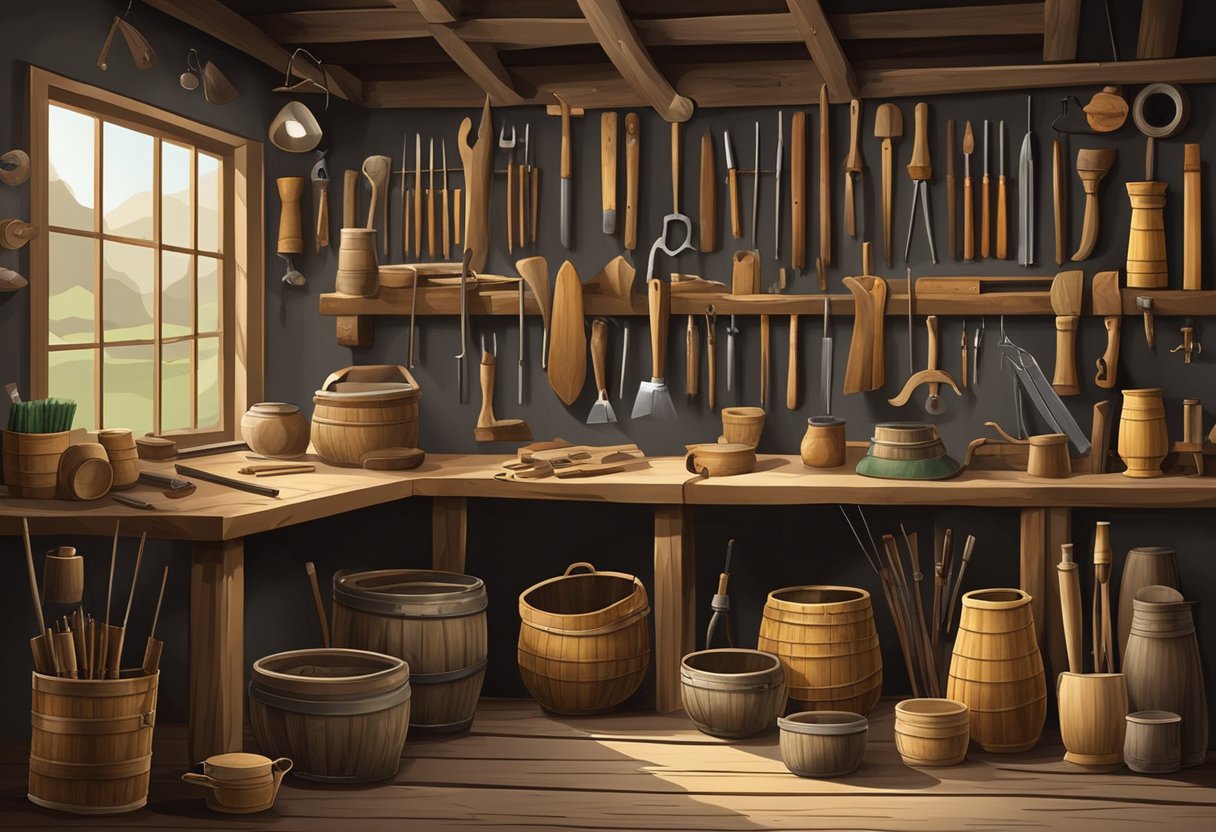
In exploring the rich tapestry that makes up Irish craft history, we unravel the intricate evolution of unique crafting traditions that are renowned worldwide. These traditions have not only become a pivotal part of Irish heritage but have also played a significant role in preserving the cultural identity of Ireland.
Evolution of Irish Lace
Irish lace began as a form of economic salvation during the hardships of the 19th century potato famine. The craft was a way to generate income, particularly for the women of Ireland. What started as a domestic skill soon became an art form in its own right, famed for its delicate beauty and complex patterns. Centres for lace-making emerged, most notably in Limerick and Carrickmacross, each with their unique style. Over time, Irish lace became a treasured heirloom, synonymous with Irish culture, and continues to be celebrated for its craftsmanship.
Aran Islands Knitting Traditions
The knitting traditions of the Aran Islands hold a special place in the chronicles of Irish craft. The iconic Aran sweater, with its distinctive cable patterns, finds its origins here. Each stitch carries its own story or symbol, often linked to the islander’s way of life, from the fisherman’s ropes to the diamond patterns representing the fields of the islands. This traditional craft not only reflects the resourcefulness of the Aran communities but also their deep connection to the environment—a craft born of necessity that has evolved into a symbol of Irish identity.
Types of Traditional Irish Crafts
Irish crafts are a tangible reflection of our cultural heritage, with techniques passed down through generations. These artisanal methods involve a range of materials and skills, creating both functional and decorative items that are treasured for their craftsmanship and link to tradition.
Weaving and Spinning
Weaving and spinning have long been central to Irish craft, with linen and wool being the main fibres used. Irish linen is renowned for its quality, often used in making tablecloths and apparel. In contrast, woollen weaving is typically associated with the creation of tweeds and the famous Aran sweaters, each stitch in knitting having its own unique meaning.
Pottery and Ceramics
Irish pottery and ceramics boast a variety of styles, from the rustic charm of simple clay pots to the elegance of fine porcelain. The rich clays found in certain regions of Ireland lend themselves to distinctive pottery techniques, resulting in pieces that are both utilitarian and works of art.
Basketry and Willow Work
Basket making, specifically using willow, is a craft that involves weaving these flexible branches to create strong and durable baskets. Willow baskets, known for their resilience and traditional designs, have served many purposes from fishing to agriculture, and continue to be a symbol of Irish rural life.
Textile Crafts
The textile crafts cover a spectrum of techniques including lace-making, considered one of the more intricate and delicate crafts. Irish lace is steeped in history, originally developed as a means of income during times of economic hardship. Each piece requires an immense level of skill, often resulting in exquisite patterns that are highly valued today.
Irish Craft Workshops and Courses
We offer a variety of traditional Irish craft workshops and courses that cater to different interests and skill levels, ensuring that every participant can find a class that speaks to their craft aspirations.
Workshop Formats
Workshops and Classes: Our workshops range from short, two-hour introductions to full-day or even week-long courses that allow for an immersive experience. We provide extensive, hands-on workshops, including pottery classes, bodhrán drum making, and silver ring-making.
Demonstrations: For those who prefer to observe and learn, our expert artisans conduct live demonstrations, detailing the processes of crafts like crystal cutting and woodworking.
Regional Specialities
Kenmare and Kilkenny: In Kenmare, lace-making courses uphold a long-standing tradition, while Kilkenny offers workshops in pottery, reflecting the region’s rich heritage in ceramic arts.
Northern Ireland: Explore the unique crafts of Northern Ireland through specialised workshops that include handwoven tweed and stained glass, taught by master craftspeople passionate about preserving their craft heritage.
Mastering Craft Techniques

We understand the importance of mastering traditional Irish craft techniques for anyone interested in the handmade and natural materials that are part of Ireland’s rich craft heritage. This section aims to guide you from beginner to expert, providing insights into the tools and materials required.
From Beginner to Expert
We believe that anyone, regardless of their current skill level, has the potential to become an adept craftsperson. Starting as a beginner, one’s journey involves understanding the basic design concepts behind traditional Irish crafts. Through dedicated practice and the accumulation of knowledge, beginners can incrementally enhance their skills. A selection of workshops and classes offers a structured approach, where experienced craftspeople impart their expertise and cultural context, ensuring students not only learn the techniques but also appreciate the craft’s place in heritage.
Attaining the expert level entails a deep comprehension of the intricacies of Irish craft. This might include mastering complex techniques in areas such as blacksmithing or textile production. The learner becomes one with the craft, deftly manipulating natural materials to create items that are both functional and imbued with meaning.
Tools and Materials
The right tools and materials are fundamental to any craftsperson’s ability to express their creativity and skill. In traditional Irish crafts, tools have evolved to be highly specific to the task at hand. Whether it’s the tongs and hammers of the blacksmith, the needles and looms of the weaver, or the chisels of the woodworker, each plays a critical role in transforming raw materials into works of art.
The selection of materials, often natural and locally sourced, reflects the Irish landscape and ethos of sustainability. Wool, linen, slate, and timber are just some examples. For the beginner, starting with high-quality but not overly complex materials is key, allowing them to focus on technique. As one advances, experimenting with a broader and more refined range of materials is recommended, adding depth to their craftwork.
By engaging hands-on with traditional crafts, we seek to preserve these timeless skills and ensure their continuity. Our commitment to embracing these crafts forms a bridge connecting us to generations past and allowing us to keep alive a treasured aspect of our cultural legacy.
Experiencing Irish Crafts
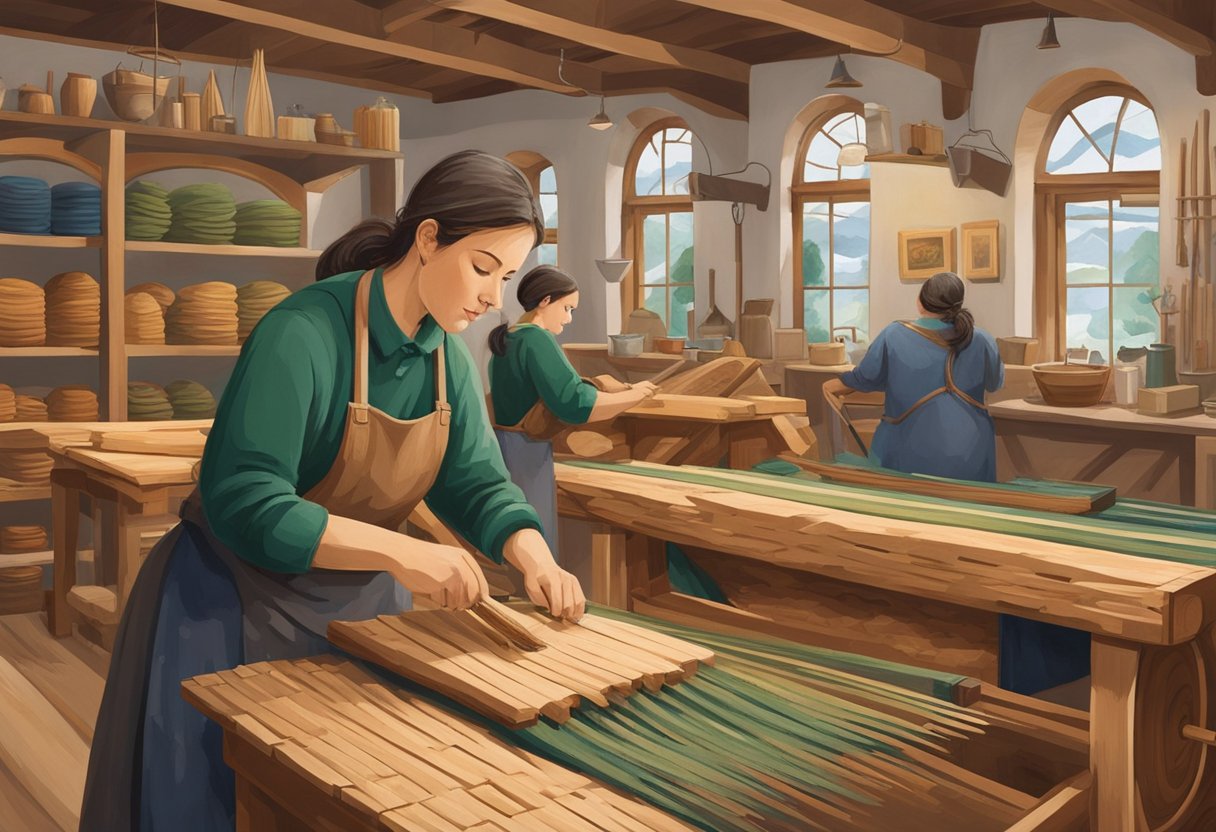
In our exploration of Ireland’s rich cultural tapestry, we place special emphasis on the traditional Irish crafts that are a vibrant testimony to the nation’s heritage. Our journey through Irish crafts is not only informative but also deeply engaging.
Craft Tours and Trails
We offer a variety of craft tours and trails that serve as a gateway to experiencing the full spectrum of Irish craftsmanship. From the rugged coastlines of Connemara, renowned for its marble carving, to the historical towns where skilled woodworkers reveal the secrets of their trade, these tours provide a comprehensive look at Irish crafts. Participants have the privilege of meeting the dedicated craftspeople who are passionate about preserving their art for future generations.
- Marble Carving in Connemara: Traverse the wilds of the west and witness the serene art of marble carving.
- Woodworking in Historical Towns: Discover the intricate work of woodworkers in Ireland’s quaint towns.
Live Craft Demonstrations
Our live craft demonstrations are curated events that bring traditional Irish crafts to life. Visitors are treated to firsthand experiences as artisans demonstrate the subtleties of their specialties, from intricate silver ring-making to the traditional bodhrán drum crafting. These demonstrations are not just viewings but interactive sessions that might allow you to try your hand under the guidance of a skilled craftsperson.
- Silver Ring-Making Workshops: Craft your own silver ring with the help of expert jewellers.
- Bodhrán Drum Crafting: Observe the making of Ireland’s iconic traditional drums and understand their role in Irish folklore.
By joining us, you embrace the opportunity to delve into the heart of Irish culture through its crafts, witnessing how traditional methods have continued to shape the Irish narrative.
Irish Crafts in Fashion
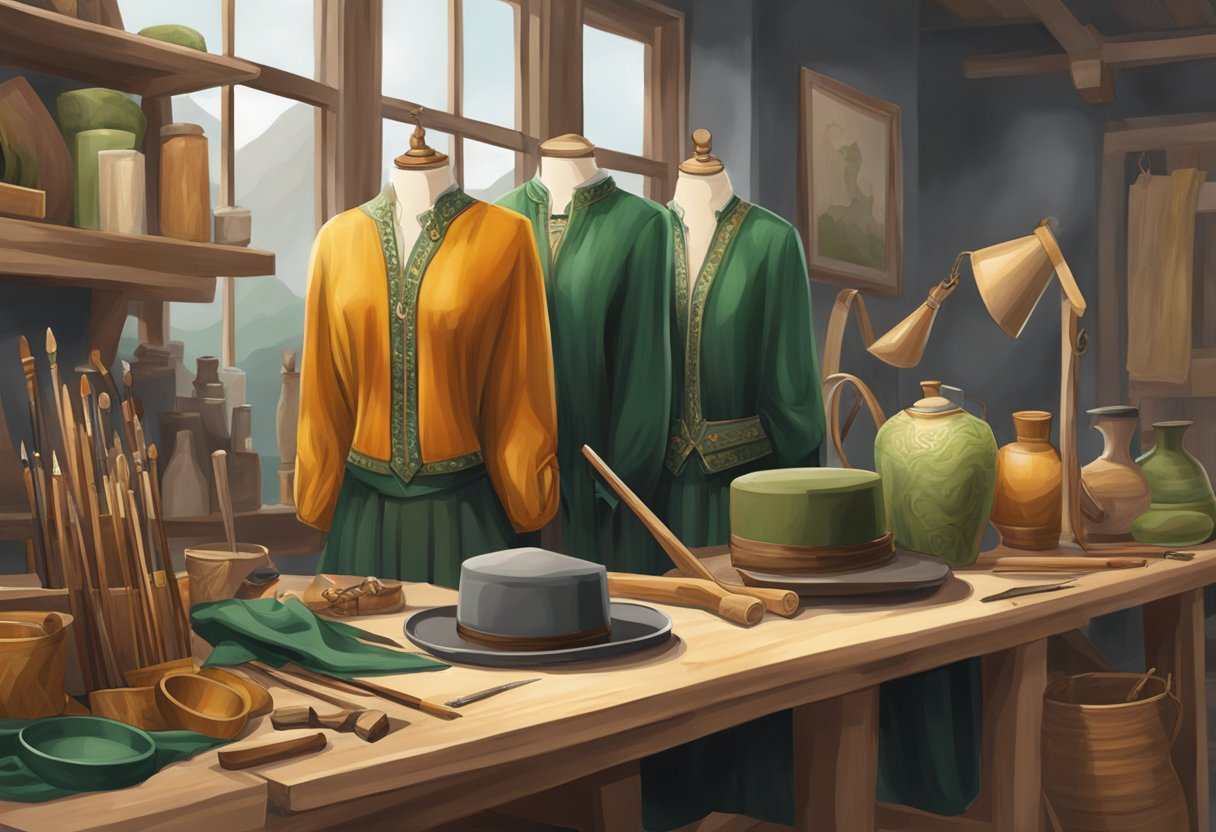
We find that Irish crafts have woven their way into contemporary fashion, creating a unique blend of tradition and modernity. Ireland’s rich heritage in textiles now informs current trends, breathing new life into age-old techniques.
Contemporary Irish Designers
Irish designers have carved a special niche in the global fashion scene, distinguishing themselves with a fusion of traditional and contemporary aesthetics. Renowned for their innovative use of knitwear, designers incorporate luxurious materials and intricate patterns into their work. The iconic Aran jumpers, traditionally made in the Aran Islands, have seen a resurgence thanks to these creative minds. Through their contemporary iterations, they’ve settled comfortably into modern wardrobes, available in various boutiques for those who favour such authentic shopping experiences.
Cultural Significance in Clothing
Clothing in Ireland is not just fabric stitched together—it is a narrative of cultural history. Our attire, especially items like the Aran jumper, serves as a testament to our cultural significance in fashion. Knitwear, in particular, has transcended its utilitarian roots to become a fashion statement demonstrating Ireland’s craftsmanship. It is through the hands of skilled artisans that we preserve the essence of Irish culture in clothing, each stitch embedding a piece of our story for the fashion world to appreciate.
Arts and Crafts for Home Decor
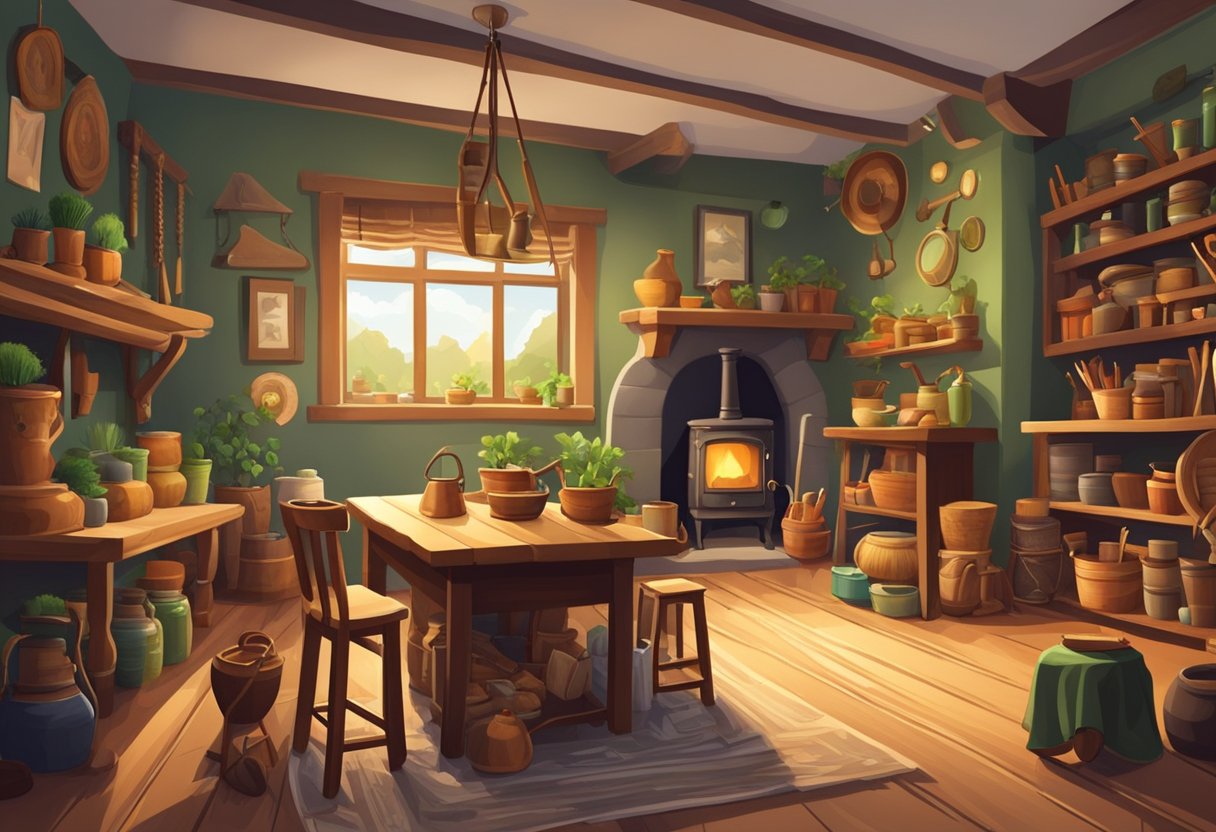
When we consider beautifying our homes with traditional Irish crafts, the choice of stained glass for light fixtures and the creation of bespoke sculptures and lettering stand out for their unique artistic contributions.
Stained Glass and Lamps
Stained glass, an art form with a storied history in Ireland, brings a splash of colour and elegance to any room. We utilise intricate patterns and a spectrum of colours to design pieces that not only encapsulate Ireland’s cultural legacy but also accentuate the personal style of your home. Stained Glass Connemara Marble Carving workshops teach the precision and skill needed to create these luminous decorations. Incorporating modern design with traditional techniques, our hand-crafted lamps not only serve as functional items but also as focal points of artistry and conversation.
Sculpture and Lettering
Sculpture, in various forms such as wood or marble, acts as an anchor in home decor, offering a tangible connection to Irish heritage through its form and material. Our workshops guide you in the craft of sculpting, enabling you to bring to life the raw beauty of natural materials with your own hands.
Lettering is another craft that offers a personal touch to your space, with each carved letter telling a story. Whether you’re looking for an impactful standalone piece or something to complement your existing decor, our sculpture and lettering workshops provide the expertise for you to create something truly individual, from vases with Celtic designs to slate house signs that carry a bit of Irish charm.
The Role of Online Platforms
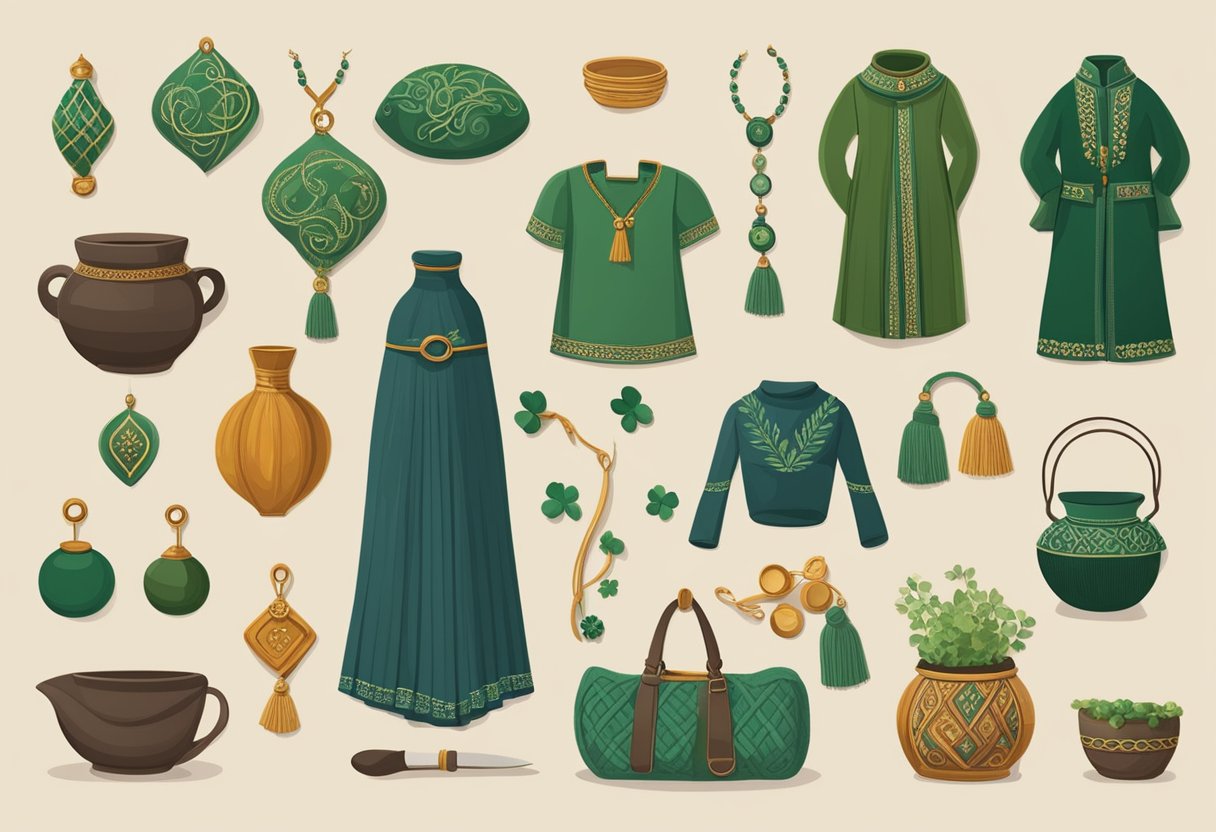
Online platforms have revolutionised the way we discover and participate in traditional Irish craft workshops. They serve as vital tools for both learning and commerce within the craft community.
Social Media and Engagement
We see social media as an essential element in both promoting and preserving the rich heritage behind Irish crafts. Platforms like Facebook enable artisans and craft enthusiasts to share their work, connect with like-minded individuals, and engage with a broad audience. By posting tutorials, live crafting sessions, or rich stories behind each piece, they foster a community deeply rooted in Irish traditions and craftsmanship.
E-Commerce for Craft Purchases
Moreover, the advent of e-commerce has opened up new avenues for purchasing authentic Irish crafts. Online shopping allows for the wider distribution of handcrafted products and enables customers to support local artisans directly. RTE has discussed how the crafts of Ireland have found new life online, with customers appreciating the convenience of browsing and buying unique, locally-made items from the comfort of their homes. This modern marketplace has become an indispensable aspect of sustaining and growing the traditional craft industry.
Promoting Irish Craft Internationally
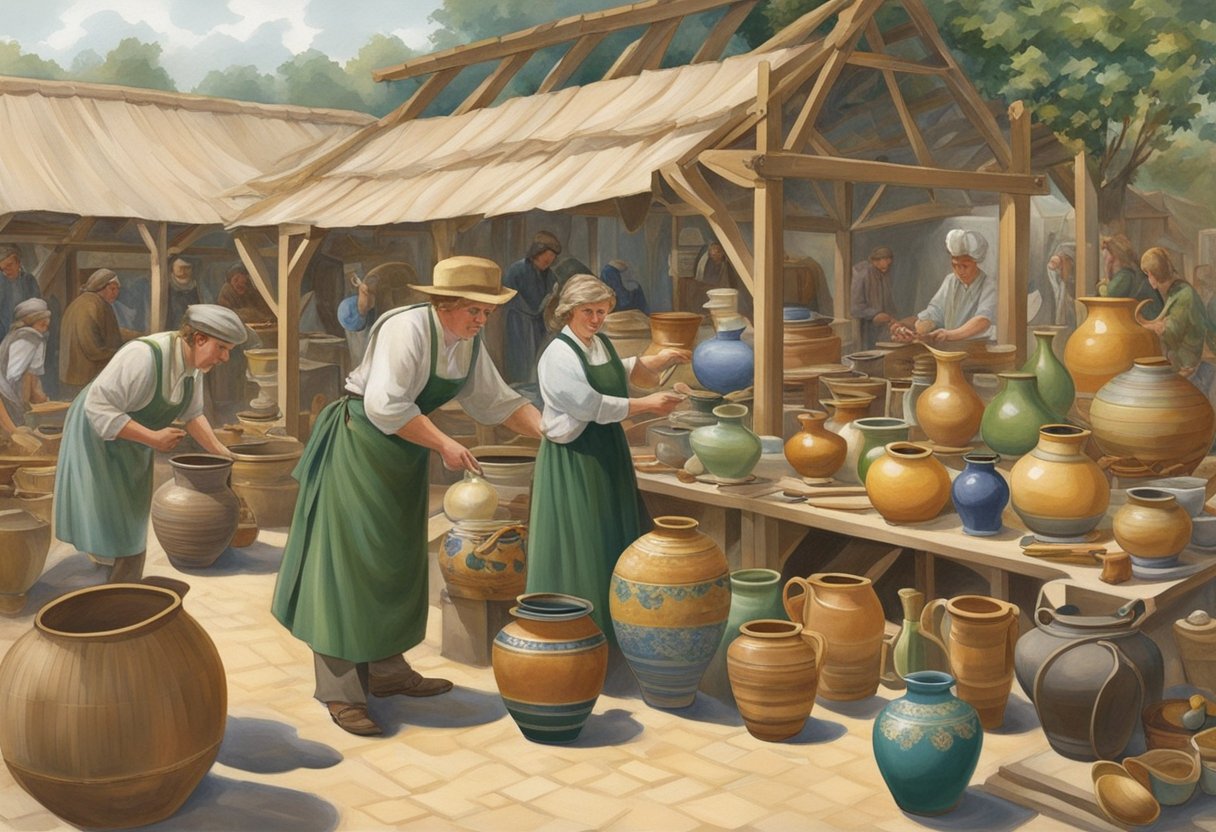
We recognise the importance of showcasing Irish crafts on the international stage, not only to share our rich heritage but also to inspire a global audience. Through strategic participation in trade shows and exhibits, and by making a mark on the global stage, we ensure that the charm of Irish craftsmanship reaches every corner of the world.
Trade Shows and Exhibits
Irish crafts have a significant presence at various trade shows and exhibits across Europe and beyond. One key event is Showcase Ireland which takes place in Dublin. It provides a platform for Irish crafters to exhibit their work to an international audience, including buyers from around the UK and Europe. This event is central to our mission of promoting Irish crafts internationally, where the diversity and quality of our artisans’ work are on full display.
Irish Craft on the Global Stage
Our crafts gain prestigious recognition when they land on the global stage. From intricate lace and pottery to handwoven tweed and unique jewellery, the essence of Ireland is captured in each piece. Events such as the European Prize for Applied Arts in Europe present opportunities for Irish craftsmen to be acknowledged among the best. We take pride in these moments, as they not only celebrate our heritage but also allow us to connect with international lovers of art and craftsmanship. By engaging with audiences abroad, we foster appreciation for our craft, ensuring a place for it on the global cultural map.
Educational Aspects of Irish Craft
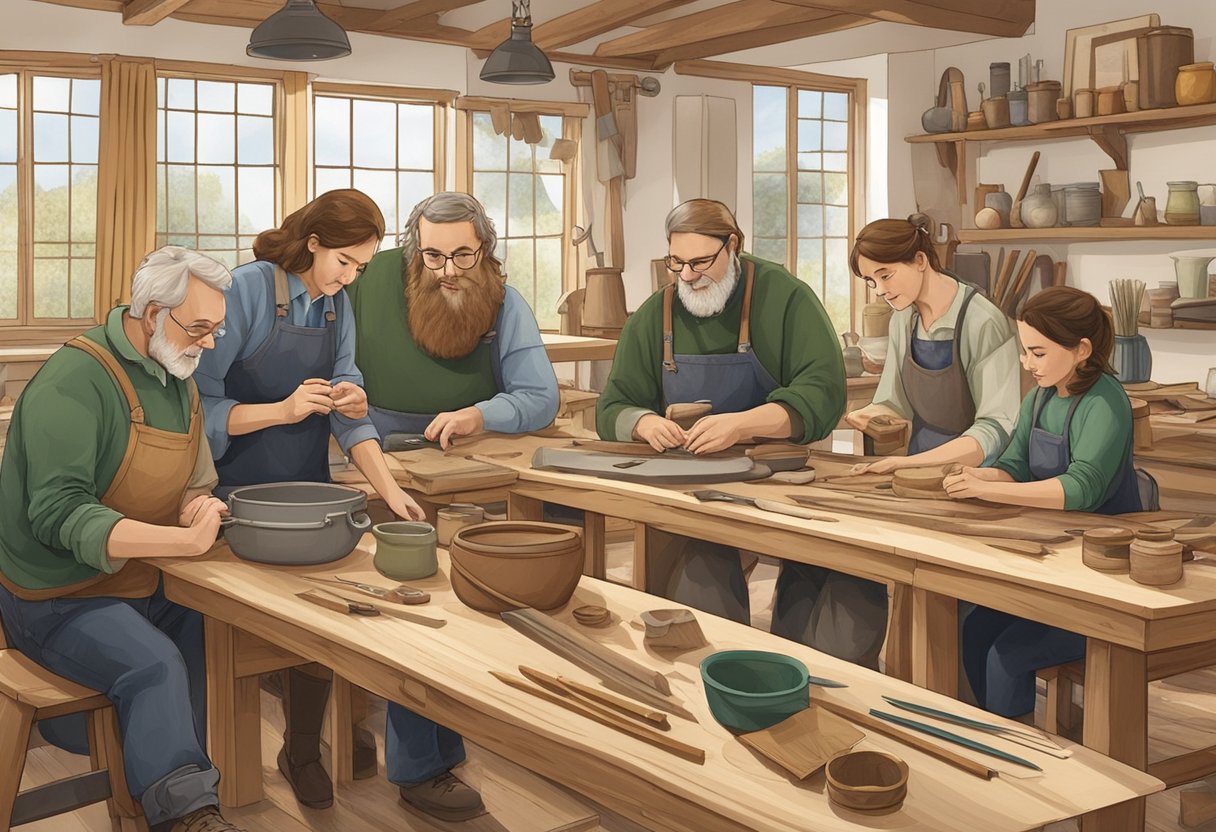
In exploring the educational aspects of Irish craft, we recognise the significant role these practices play in conveying knowledge and fostering a deeper connection with Irish culture. Our focus will be on their integration into school curricula and the availability of public workshops and seminars.
Crafts in School Curricula
Incorporating traditional crafts into school curricula ensures that the essence of our cultural heritage is passed on to younger generations. By engaging students with hands-on courses within the school environment, they gain a practical understanding of crafts such as handwoven tweed or pottery. This approach not only enriches their knowledge but also helps in preserving these skills for future generations.
Public Workshops and Seminars
We organise public workshops and seminars that provide people with the opportunity to learn about traditional Irish crafts. These events include demonstrations and interactive sessions conducted by skilled artisans. They offer participants an in-depth look into the crafts’ histories and their place within Irish culture, thus strengthening community ties and cultural awareness. Through platforms such as Crafts of Ireland, individuals can discover a range of craft workshops, including lace making and wool spinning, that honour our rich craft heritage.
Sustainability and Craftsmanship
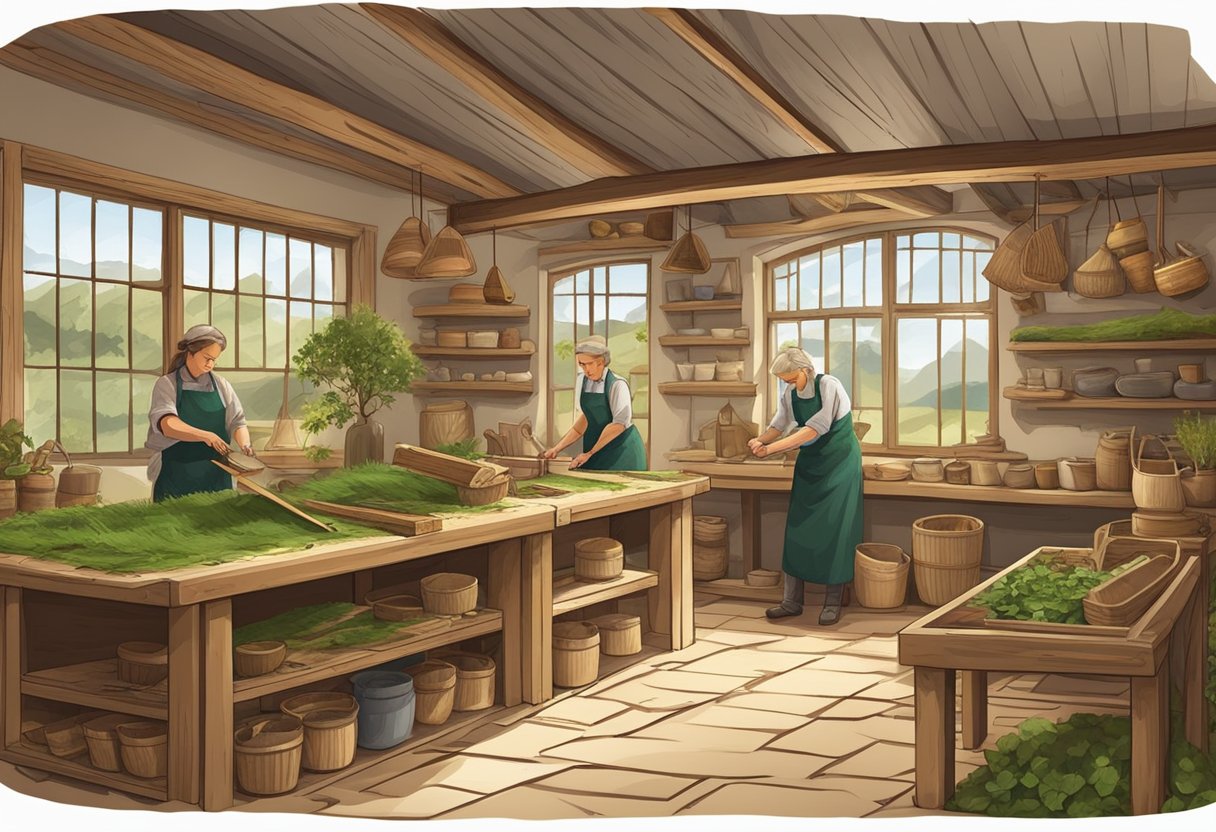
In our exploration of traditional Irish craft workshops, we recognise the interplay between sustainability and craftsmanship as a vital component. Craft practices often draw from a profound respect for the environment, emphasising the use of natural materials and the preservation of heritage skills.
Utilising Natural Materials
We find that traditional Irish crafts are intrinsically linked with natural materials. Artisans often source local, sustainable fibres, woods, and botanicals, reflecting a commitment to the environment. For instance, in the production of the famous Aran sweaters, natural wool is not only praised for its durability and warmth but also for its biodegradability, underscoring an ecological consciousness.
Preserving Traditional Skills
Moreover, our continuous efforts in preserving traditional skills play a crucial part in maintaining ecological balance. By valuing knowledge passed down through generations, we ensure that time-honoured techniques such as hand-weaving and pottery do not succumb to industrial methods that can be harsh on the environment. This reverence for craft not only conserves unique cultural expressions but often aligns with sustainable practices.
Frequently Asked Questions

We’ve compiled some of the most commonly asked questions about traditional Irish craft workshops, providing insights into the regions known for craftsmanship, the variety of available workshops, how to locate local workshops, unique Irish crafts, online resources, and the breadth of techniques taught.
Which regions in Ireland are renowned for their craft workshops?
Several regions in Ireland are celebrated for their heritage in crafting, including the West for its weaving traditions, the Midlands known for woodturning, and the South West where pottery and ceramics thrive.
What variety of workshops are available to adults interested in learning traditional Irish crafts?
Workshops range from basket-weaving and thatchwork to Celtic jewellery-making and hand-weaving of textiles. Adults can also engage in pottery, glass blowing, and leather crafting.
How can one find Irish craft workshops in their local area?
To discover craft workshops nearby, check local tourist information centres, visit community boards, or explore directories and websites dedicated to Irish crafts and heritage, such as Crafts of Ireland.
What unique crafts are prominent in Irish heritage and culture?
Prominent crafts in Irish heritage include Aran knitting, with its distinctive patterns, and Belleek pottery, revered for its delicate and intricate designs. Moreover, traditional musical instrument making, particularly for the Uilleann pipes and Bodhráns, holds historical significance.
Are there any resources online to learn about Irish crafts?
Yes, online resources are available, including websites that feature articles on Irish craft history and specific craft websites offering detailed workshops, history, and techniques.
Do craft workshops in Ireland offer sessions on both contemporary and traditional techniques?
Many Irish workshops celebrate both contemporary and traditional crafting methods, with an emphasis on preserving time-honoured techniques while embracing modern aesthetic trends and new materials.




